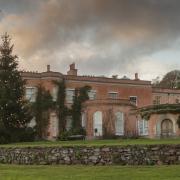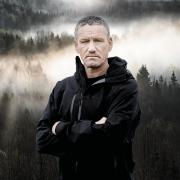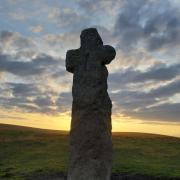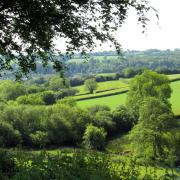It’s a big celebration year for the world famous Sidmouth Folk Festival. To mark its 70th year, music fan Kirstie Newton has been calling up the folk scene’s stars to find out what they think makes this week-long event so very special.
For one week at the beginning of August, something truly marvellous happens in Sidmouth. Marquees, pubs, even living rooms throb to the pulse of the drum, voice, mandolin. This is Sidmouth Folk Festival, and it celebrates its platinum jubilee this year.
‘On a sunny day, it’s hard to imagine a prettier spot,’ says Streets of London singer Ralph McTell, who has played Sidmouth several times and even presented the BBC radio coverage in 1996. ‘There’s almost every conceivable kind of music, alongside rural skills like woodturning and garment making. Around every corner there’s a Morris dancer or busker, and the pubs are alive with music.’

Peggy Seeger – grande dame of folk, half-sister of Pete Seeger and the ‘face’ of First Time Ever I Saw your Face, written for her by husband Ewan McColl – is a Sidmouth stalwart, having started going ‘way back’ in the company of fellow luminaries Martin Carthy and Norma Waterson.
‘Sidmouth has always been special to me - it’s by the seaside, and everything is enclosed and near the shore, which I like,’ says Peggy, who appears in conversation (and might sing ‘off the cuff’ if you’re lucky).
‘But I also like the fact that a few venues are far flung, like churches and halls and even people’s front rooms. You get less background noise in those, and you might find something unexpected that you wouldn’t have dreamt of going to see – you're surprised, and a box is opened for you.’

The 2024 line-up is as stellar as any that have gone before. Pre-festival warm-up acts include the Fisherman’s Friends, folk-rock behemoths Steeleye Span and George Hinchliffe’s Ukulele Orchestra of Great Britain, while the event proper sees musicians from around the British Isles, including Welsh harpist Catrin Finch, Yorkshire songbird Kate Rusby and Scottish musician Karine Polwart; and home-grown Devonian talent including Steve Knightley unveiling his new sound, and Jim Causley celebrating the work of Devonian folk-song collector Sabine Baring-Gould.
Factor in 600 individual events every year, from gigs and workshops to hobby horses trials on the beach and a grand finale featuring a torchlit procession and a fabulous firework display, and you can see why so many people blank out their diaries for the week.
‘The population here is around 12,000 people but in festival week, it can swell to three times that and covers every bit of available space in town,’ says Tim Shardlow, manager of Sidmouth Tourist Information Centre (TIC). ‘It has put us on the map in an international sense, drawing people from all over the world.’

At this time of year, Tim Shardlow and his TIC team are ‘in the thick of it’, selling tickets, dishing out info and fielding last-minute accommodation requests. While many performers and punters come year on year, often reserving next year’s accommodation as they leave, others happen upon the festival by accident. ‘They say: “We had no idea - we just came in for the day and walked into the middle of a wall-to-wall event”,’ Tim laughs.
Local businesses collaborate to make the most of the influx of visitors. Campsites club together to put on a shuttle bus, while the rugby and cricket clubs open up for car parking. Hospitality businesses do especially well, and donate generously to the festival as a result; there’s also a scheme for residents to be paid to host someone in their home.
While there will inevitably be some folk-averse locals who resent the inconvenience caused by hordes of visitors, most recognise the benefits and suck it up. ‘You make sure you get your shopping in the week before, and leave a little longer to get anywhere,’ says Tim. ‘Like any town, Sidmouth needs to attract business to thrive, and provide a stimulating environment for the people who live here.’

Also 70 this year, Exmouth boy Steve Knightley credits the festival with playing a pivotal role in his musical career. ‘I took up the guitar in my teens,’ he says. ‘I knew there was this event and thought I would go with friends and busk. That folk generation were in their early 20s – the kind of guys you want to hang out with, stay up late with.
‘It was the first time I’d snuck out from home. We slept in Connaught Gardens, and were woken by the police in the early hours.’ He chuckles: ‘I was disappointed to find my parents hadn’t even noticed my absence.’
The experience lit a touchpaper. ‘To find that not all English folk music was like the Spinners or the Weavers was inspirational and something to aspire to.’ When Steve returned to Sidmouth in the early 90s, he was on the bill with Show of Hands partner-in-crime, Phil Beer. ‘We started out in a pub just north of town, and as we moved up the folk food chain, we became headliners in our own right.’

Today, he’s a festival elder - a patron, and an ambassador. ‘It’s nice to be recognised as part of the landscape as much as it’s part of me,’ he smiles. Where better to launch his new project: Dream in Colors, ‘a fusion of trance, rhythmic beats and world music grooves’, with a line-up featuring Johnny Kalsi of Afro Celt Sound System and The Dhol Foundation.
‘It’s a very different departure for me, and I’m nervous as hell,’ he admits. ‘It’s really special to be launching it at Sidmouth, which is the first proper folk festival we’ve done.’
The distinction between performer and audience is quite blurred. ‘It’s not like Glastonbury where the headline act is flown in and out by helicopter,’ says Derek. ‘It’s much more democratic - you’re likely to meet John Kirkpatrick and Martin Carthy in the crowd, or in the queue for a cup of tea.’

Steve Knightley – who met his wife at the festival, and celebrates his wedding anniversary during that week - concurs. ‘It validates your choice to see people like that hanging out, even when they’re not being paid to do so.’
‘It’s like a fellowship of music – you can buzz around and see who’s still alive, in my case,’ laughs Ralph McTell, who turns 80 later this year. He recalls chancing upon a group of melodeon players in a hotel room. ‘The melodeon is a much-maligned instrument due to its slightly mournful sound, but I sat there for a good hour listening in. That’s exactly what it’s all about – egoless music for the sheer joy of playing and sharing tunes.’
On Ralph’s hitlist this year is Steeleye Span. ‘Maddy Prior is one of the great heroes of the movement, an old soldier like me,’ he muses.
For her own part, Maddy remembers coming to Sidmouth as a duo with Tim Hart, ‘in the early days when it was just along the seafront and mostly dance. It was very jolly as I remember. Now it’s gone back to being a folk event, I really enjoy it – I understand it well, because it’s where I come from in my music.’

What does the future hold for Folk Week? ‘I would say there’s every chance of 70 more years,’ says Maddy, pointing to ‘a big rise in interest in folk music among young people’, many of whom have been brainwashed by their parents’ in-car entertainment on long drives to holiday destinations (guilty as charged). With that in mind, children aged 11 and under enjoy free entry this year.
Tim Shardlow adds: ‘People would like to see it carry on forever, although the baton will be passed to new people.’ That goes for the music too – Devon charity Wren Music – patron: Peggy Seeger - has led Stories of Sidmouth, working with year 10 students from Sidmouth College to create new folk songs based on the memories of town residents. You can hear these on Sunday, August 4 from noon.
The final word goes to Steve Knightley, who summarises the Sidmouth experience perfectly: ‘A day at Sidmouth Folk Festival is a day in your life that has all the ingredients: sunshine, music, people telling you you’re great. Long may it flourish.’
The 70th Sidmouth Folk Festival runs from August 2 to 9. sidmouthfolkfestival.co.uk

Surviving seven decades
That this standard bearer for traditional music has survived, often in the face of adversity, bears testament to the strength of its loyal following – both local and national, punter and pro. No one knows this better than Derek Schofield, who attended his first festival in 1971 and has since taken part in every perceivable aspect of the event, having performed, directed arena shows, and even written a book to mark its half-century. As the festival’s de facto historian, his knowledge of line-ups and trends is encyclopaedic. ‘Everyone turns to me to answer questions.’
In 1955, in the midst of a big square-dancing boom, the English Dance Society wanted a second location to complement its flagship event in Stratford; a canny Sidmouth folk fan put his hometown forward. That first festival was ‘small scale, but with a missionary zeal to get people more interested in folk music and dance’, says Derek. Troupes would spend the mornings rehearsing for afternoon displays in Blackmore and Connaught Gardens (both of which host informal entertainment to this day).
As one of the first folk festivals, Sidmouth was a novelty among the classical repertoire of that time and the pop extravaganzas that followed. It flourished as folk grew in popularity during the 1960s and dedicated clubs popped up around the UK. Derek pays tribute to Bill Rutter, who steered the event during this time. ‘Bill was liberal in politics and attitude to life, and was keen to bring an international flavour to proceedings at a time when no one else was doing that.’ As Sidmouth’s appeal grew, so a new venue had to be found. The local authority had purchased the Knowle building and parkland, which was a natural amphitheatre for large open-air concerts. But with success came risk. ‘As the festival grew, it became a bigger and bigger part of the society, to the point that if something happened to the festival, it would have bankrupted the society.’

The decision was made to give it independence, and it was taken on by Mrs Casey Music from 1986. This was the era of big headliners and sell-out shows: Lonnie Donegan, Quebec stars La Bottine Souriante (and, more controversially in retrospect, Rolf Harris). As a large festival with a huge open-air arena, Sidmouth was attracting acts on a circuit with Edinburgh – and faced a huge responsibility and a potential liability.
In 2004, the festival found itself once again the victim of its own success, when the organisers stepped down and East Devon District Council withdrew some of its funding. ‘It seemed like the end of the road,’ says Derek. ‘But those who loved it had invested time, energy, emotion into it and didn’t want it to end. A group of townsfolk and music lovers came together to make sure it continued.’
Under the watchful eye of a limited company and a registered charity (chairman: Derek, secretary/treasurer: Tim), the event went back to its folk roots, on a much-reduced scale. The open-air Knowle arena, ‘too risky with British weather’ was abandoned in favour of the Ham, a 1,200-seater weatherproof marquee. The international aspect, meanwhile, had become more difficult to accommodate.
‘Performers were being put up in school classrooms, with camp beds and sleeping bags,’ says Derek. ‘It wasn’t appropriate, and it would be impossible with today’s visa requirements.’
There is still an overseas aspect with Irish and American singers, and a desire to retain exotic colour on a smaller scale. ‘Right from the early days, we had groups from immigrant communities around the UK – Ukrainian, Polish, Bhangra.’ Folk Week, as locals affectionally call it, ‘is about being proud of English traditions, but not to the exclusion of everything else’.



























